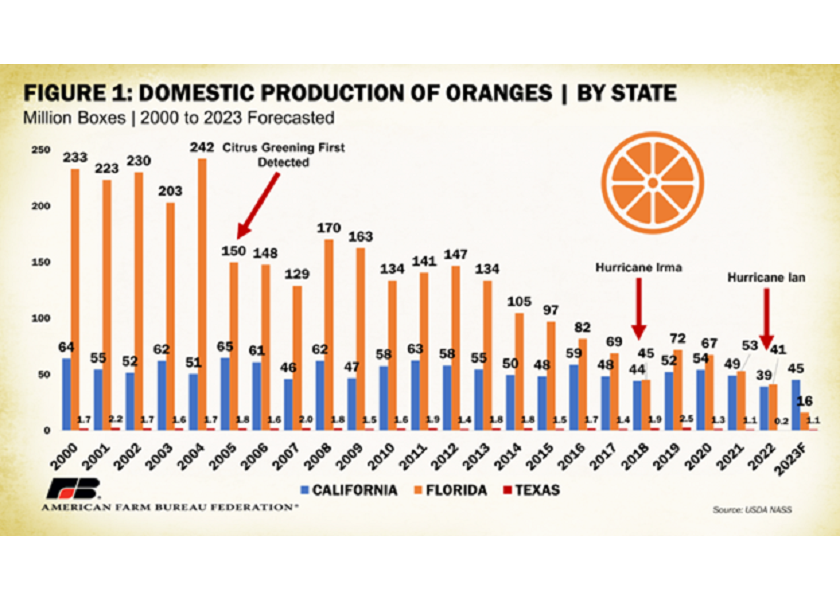U.S. citrus global leadership is sliding, Farm Bureau warns

U.S. declines in citrus production have diminished the country’s long-time status as a world leader in citrus market share, according to a new report from the American Farm Bureau Association.
Authored by economist Daniel Munch, the Market Intel report said that the U.S. produced nearly 50% of the world’s oranges in 1970 but only 5% in 2023.
“Once leaders in citrus crop production, citrus farmers in the United States, particularly in Florida, have faced numerous challenges that have led to an unfortunate decline in domestic supply,” Munch said in the report.
While U.S. supply of citrus has declined, imports have grown substantially, the report said.
“In 2000, the U.S. imported just under 9 million boxes of fresh citrus fruits; in 2022 that number jumped over 320% to over 37 million boxes,” Munch said in the report. About half of those citrus imports were sourced from Mexico, followed by Chile (15%) and Peru (10%). While imports have jumped fourfold, the report said U.S. exports of citrus dipped from 26 million boxes in 2000 to just 12 million boxes in 2022.
“Citrus production in the U.S. has dropped to levels so low that U.S. citrus producers can no longer support domestic demand nor lead the world in market share,” Munch said in the report.
The global citrus share reduction in the U.S. has been taken by Brazil (35%), China (16%) and European Union (12%), he said in the report.
Florida’s challenges with citrus are documented in the report. While weather events have played a role, the report said the production risks from extreme weather events have been “overshadowed” by the ongoing presence of citrus greening disease. The incurable disease is carried by the Asian citrus psyllid, a small sap-sucking insect invasive to the Western Hemisphere, the report said.
First detected in Florida in 2005, the disease causes premature fruit drop, resulting in smaller and misshapen fruit, the report said.
“Since 2005, orange production in Florida has dropped 90%, from 150 million boxes to a mere 16 million boxes expected in 2023,” Munch said in the report. In addition, between 2002 and 2017, the number of citrus growers in Florida decreased from 7,389 to 2,775 (a 62% decline) and the number of juice processing facilities decreased from 41 in 2003 to 14 in 2017 (a 66% decline), according to the report.
Like oranges, grapefruit output has seen a continuous drop in domestic production heavily linked to the weather and disease factors affecting Florida, the report said. “Since 2000, domestic grapefruit production has dropped from 67 million boxes to 8 million boxes, an 88% decline,” Munch said in the report said. The percentage of domestically grown grapefruit grown in Florida shrunk from 80% in 2000 to just 20% in 2023.
By way of contrast, the grapefruit share for California rose from 11% in 2000 to 51% in 2023, the report said.
However, the report noted that U.S. lemon production, exclusive to California and Arizona, has stayed in a range between 20 and 30 million boxes since the 1980s.
“The only citrus fruit category to show a clear increase in production is the tangerine category, which includes tangelos, mandarins, clementines and traditional tangerines,” Munch said in the report. “Successful marketing campaigns showcasing easy-peel seedless options in small handheld sizes have boosted the share of fresh consumption of tangerines to over 40% of the fresh orange/tangerine market, up from under 20% in 2000.
California is projected to produce over 97% of U.S. tangerines in 2023 with the remainder in Florida, the report said. In 2016, California surpassed Florida in terms of total citrus fruit production, which the report said was a function of lower Florida output rather than higher California production.
Help needed
The report said the “lack of novel innovations and support for research” to help growers manage and control the spread of citrus pests and diseases worsens the long-term outlook for domestic citrus markets.
The author urged continued investment in research to fight citrus greening.
“Recurring authorizations of programs including the Emergency Citrus Disease Research and Development Trust Fund are essential to finding effective, financially sustainable solutions for farmers combatting these diseases,” Munch said in the report. “Additionally, ensuring risk protection programs, such as crop insurance, provide affordable and adequate protection of high-value specialty crops such as citrus is critical to maintaining operations in the face of natural disasters.”
In his conclusion, Munch said it is “vital” that farming, regardless of crop type, remains an economical option in the U.S.
“Land-use dynamics, high costs and regulatory networks that discourage farmers from producing domestically puts national food security at risk and sends production overseas,” he said in the report.







